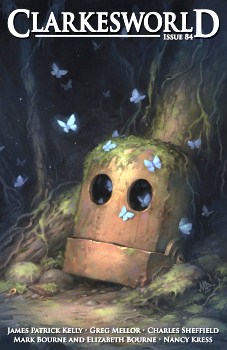 Clarkesworld #84, September 2013
Clarkesworld #84, September 2013
Reviewed by Matthew Nadelhaft
Clarkesworld’s September issue contains three original stories, each one of which is strangely reminiscent of a past classic. Perhaps all good themes come around again, with new twists and interpretations. Is it a limitation of the genre, that stories sharing similar topics and concerns should come to resemble each other? Or maybe it is proof of just the opposite: that science fiction’s rich history pollinates its present.
“Mar Pacifico,” by Greg Mellor, describes a lonely and frightening world left behind after a well-intentioned apocalypse. Masses of nanobots were dumped into the oceans in an effort to roll back the ravages of pollution but, in a twist reminiscent of Greg Bear’s “Blood Music,” the nanobots evolved into something with a will of its own – a life-form called algeron that swallowed up almost every other living creature on the planet. The narrator, with her daughter Kelly – lone survivors – roam their empty beach, haunted by algeron replicas of loved ones and lost life. But is the algeron hostile, or is it working, in its own, unfathomable way, to repair the devastation wreaked by human kind on the environment? It’s a powerful image, although at times overworked, with prose that tries a little too hard, and carries the familiar warning about the double-edged sword of technological advancement.
James Patrick Kelly’s “The Promise of Space,” like Samuel Delany’s classic “Aye, and Gomorrah,” explores the human cost of space exploration. Like Delany, Kelly imagines unfiltered radiation wreaking havoc upon the health of astronauts, and explores the implications of the astronauts’ compromised health upon their relationships. But Kelly takes a new and compelling approach to the subject in focusing on the mental life of the astronaut. Kelly’s astronaut, Kirk Anderson, suffers from a form of Alzheimer’s disease as a result of his time in space. His mind is propped up by something called an augment which, using recordings of Kirk’s life, helps him to remember his past and those dear to him. But is it Kirk, remembering, or the machine? The story is told in the form of a dialogue with his wife, Zoe, in a hospital as she tries to help Kirk and his augment recover his personality. Their conversation reveals touching and tragic details about their marriage as well as frightening truths about the space program. While there are some questionable sections in which masses of information are conveyed in unrealistic chunks of dialog, the premise is so powerful, and the ending so heart-breaking, that I’ll keep this story in mind for many future rereadings.
“One Flesh,” by Mark Bourne and Elizabeth Bourne, tells a complicated story of life, death, and rebirth during an exploration of Jupiter. Ras Bodogom and Jen Kangeledes, husband and wife scientists, are part of a team studying the giant planet. Each has a narrative strand, told in different tenses and, we learn gradually, at different times. Ras is at the base on Callisto while Jen explores Jupiter in the body of a Jovian life-form. Her first-hand experiences of Jupiter’s beauty and the strange lifecycle of its creatures recalls Clifford Simak’s “Desertion.” Despite the idyllic descriptions of Jen’s experiences something has gone terribly wrong with the program, and only towards the end of the story do we learn of the tragedies suffered by both partners. The concepts behind the story are solid and fairly well-sketched, but I found the narrative rather drawn out, with so much description and so many scene changes it was difficult to maintain the suspense of waiting to find out what had gone wrong.